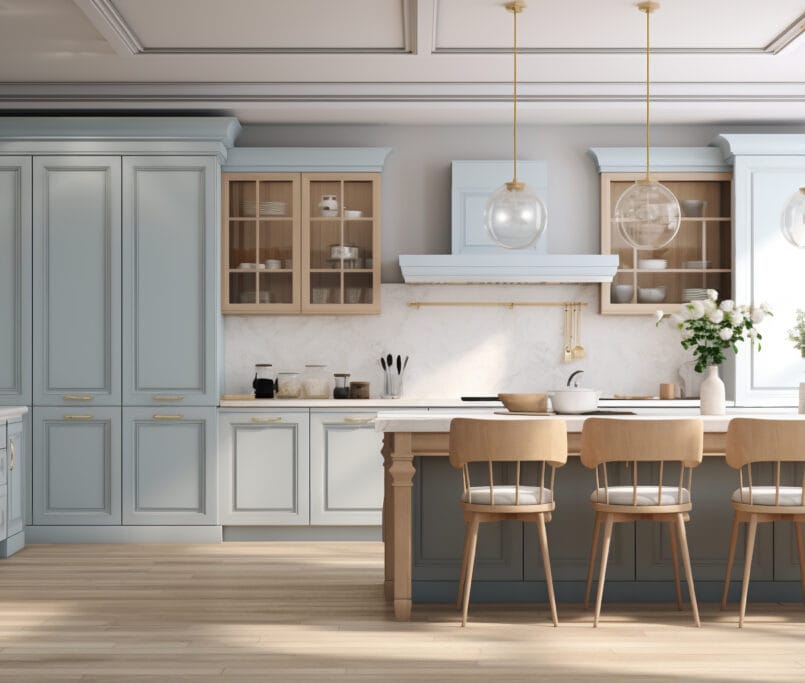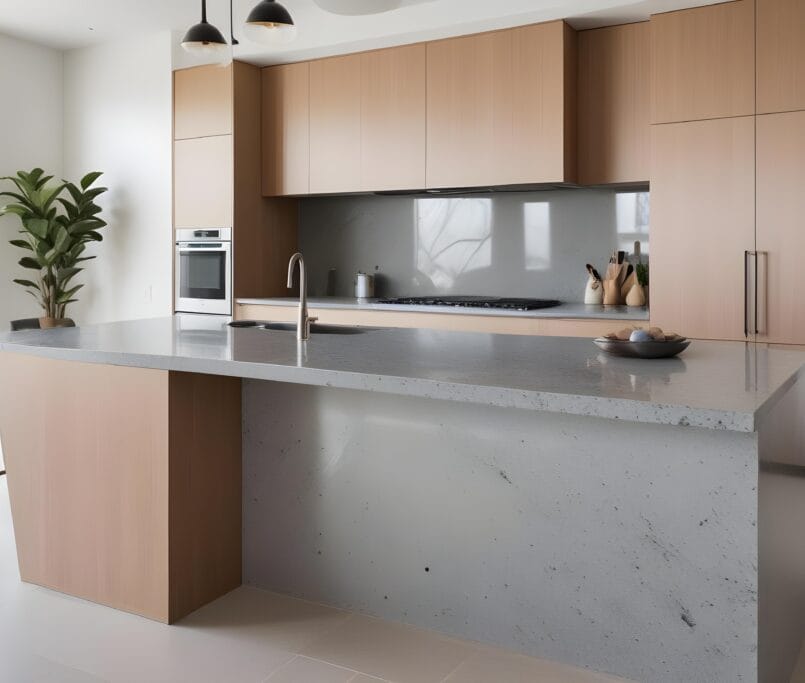4 Kitchen Countertop Mistakes That Are Vital To Avoid Making Them Look Older Than They Are
Countertop mistakes especially in kitchens are often overlooked and this can result in more damage especially overtime. There are many different aspects that should be looked into to reduce the risk of damage on kitchen countertops; therefore, increasing their longevity. Here are 4 important countertop mistakes that can make your kitchen look older than it really is.
Kitchen Countertop Mistakes #1: Using Harsh Chemicals

Using harsh chemicals on kitchen countertops is a common mistake that can lead to long-term damage and a diminished aesthetic appeal. Harsh chemicals such as bleach and other intense and heavy duty commercial cleaners can further degrade the surface of various countertop materials. For instance, natural stone countertops like granite and marble are particularly vulnerable to acidic substances and harsh cleaners which can cause etching and discolouration, resulting in damage over prolonged use.
Quartz countertops are known to be more resilient but can still suffer from the breakdown of their protective resin; thus, leading to dullness and potential staining. Laminate countertops which are more sensitive may experience peeling or bubbling when exposed to aggressive chemicals overtime. Beyond the physical damage, the use of harsh chemicals poses health risks as residues from these elements can linger and contaminate food preparation areas; thus, potentially leading to ingestion or skin contact with these toxic substances.
Additionally, these chemicals can contribute to indoor air pollution which becomes a danger as it poses respiratory hazards, particularly in poorly ventilated kitchens and households. Instead of harsh chemicals, it’s advisable to use mild or natural cleaning solutions such as diluted dish soap, vinegar and baking soda which are known to be effective yet gentle. Regular maintenance with these milder agents can help to maintain the countertop’s appearance and integrity without causing harm or extensive damage.
For tougher stains, specialised cleaners designed for specific materials can be used sparingly and as directed by the manufacturer. Emphasising the use of gentle cleaning methods does not only extend the lifespan of your countertops but also ensures a healthier kitchen environment. By avoiding harsh chemicals, the beauty and functionality of kitchen countertops can be well taken care of and preserved; therefore, making the kitchen a safer and more pleasant space for cooking and gathering.
Kitchen Countertop Mistakes #2: Using Abrasive Tools

Using abrasive tools on kitchen countertops can lead to significant and severe damage, often times irreversible. Abrasive tools such as steel wool, scouring pads and rough sponges can potentially scratch and wear down the surface of various countertop materials. Despite their durability, materials such as granite and marble can still suffer from micro-abrasions due to the usage of such materials which can dull their polished finish over time.
Quartz material that are well-known to be resistant to scratches can still be damaged by the prolonged use of abrasive materials. Laminate countertops are extremely vulnerable as their protective coating can be eroded easily; thus, exposing the underlying material to moisture and further damage. Even stainless steel countertops may develop smaller scratches and eventually lose their sleek appearance when subjected to harsh scrubbing and cleaning materials. The use of abrasive tools does not only compromise the aesthetic appeal of countertops but will also their functionality over prolonged usage. Scratches can become breeding grounds for bacteria which in turn makes the surface less hygienic for food preparation.
Additionally, abrasive damage can make the warranties provided by countertop manufacturers null and void; hence, leaving homeowners without an option for repairs or replacements. Instead of using abrasive tools, it is recommended to use soft cloths or non-abrasive sponges that are design for gentle and regular cleaning. For more tougher stains, using baking soda paste or specialised non-abrasive cleaners can effectively remove grime without risking and compromising the integrity of the countertops. Additional preventative measures such as using cutting boards during food preparation and cooking can also minimise the need for frequent and aggressive cleaning.
By steering clear of abrasive tools and utilising gentler cleaning methods, homeowners can preserve the beauty and longevity of kitchen countertops which in turn helps in ensuring that the countertops remain a pristine and functional aspect in the home for many years to come. Proper care and maintenance are key to maintaining the value and appearance of kitchen countertops.
Kitchen Countertop Mistakes #3: Overlooking Instructions

Overlooking the manufacturers instructions when cleaning kitchen countertops can lead to a multitude of issues that may compromise both the functionality and aesthetic appeal of these surfaces. Each countertop material such as granite, quartz, marble and laminate come with unique properties and care requirements which are encouraged to be followed. Granite, for instance, typically needs periodic sealing to maintain its resistance against stains and moisture, whereas quartz countertops are non-porous and require different maintenance protocols when in use over time. Marble is known to be more porous and sensitive to acids; thus, cleaners that are gentle are often recommended in order to avoid etching and staining of the material.
By disregarding these specific instructions, homeowners risk using inappropriate cleaning agents that could cause major and irreversible damage to their countertops. Some of these damages may include discolouration, scratches or even the weakening of the material’s structure and integrity. Moreover, improper care techniques such using harsh tools on delicate surfaces or excessive water present on laminate can often lead to premature wear and it may be costly to repairs or look for replacements. Ignoring guidelines can also void warranties; hence, leaving you financially responsible for any damage.
Regular maintenance as per the manufacturer’s recommendations often includes cleaning methods and frequency of resealing. Following these steps ensures that countertops not only remain beautiful but also hygienic and durable over longer periods of time. In contrast, neglecting these tailored instructions often results in a diminished lifespan of the countertops which in turn makes them prone to unsightly stains, cracks and other forms of deterioration.
Ultimately, adhering to the manufacturers care instructions is extremely important when it comes to preserving the items and elements that homeowners have installed in their kitchen countertops. This ensures that these countertops remain as a durable and attractive feature of your home for years to come. By doing so, homeowners protect the surface from preventable damage while maintaining its aesthetic appeal. This is key in upholding the material’s intended functionality; therefore, enhancing the overall value and look of the kitchen space.
Kitchen Countertop Mistakes #4: Improper / Delayed Maintenance

Neglecting regular maintenance of kitchen countertops can lead to a huge array of problems that can compromise both the appearance and functionality of these elements. Over time, daily use of these areas results in the accumulation of dirt, grime and food particles which can become difficult to remove if not addressed quickly and promptly. Without regular cleaning, countertops can harbour bacteria which can pose health risks especially in areas where food is prepared.
Additionally, neglecting to reseal natural stone countertops such as granite or marble can make them vulnerable to staining and etching from acidic substances like vinegar, wine or other citrus juices. The sealant acts as an important protective barrier which is helpful in preventing liquids from penetrating the porous surface of the material. When this barrier is not maintained well, the countertop tends to absorb spills; thus, leading to permanent discolouration and damage especially after prolonged use.
For laminate countertops, the edges and seams are particularly susceptible to water damage especially when not regularly checked and maintained. Excess moisture in the area can cause the laminate material to peel or swell; hence, resulting in unnecessary and costly repairs. Similarly, wooden countertops require periodic oiling to prevent them from drying out and cracking from wear and tear. Failing to do so can result in splits and warping which results in diminishing both their aesthetic appeal and structural integrity.
Regular maintenance also includes addressing minor scratches and chips before they become larger and more apparent. Small imperfections can often be buffed out or filled with appropriate materials and this is key in preventing the need for more extensive repairs later on. Moreover, routine inspections can help identify potential problems early. This may include irregularities such as loose seams that need replacement; thus, ensuring that the countertops remain securely in place and are able to maintain its functionality as intended.
In conclusion, neglecting regular maintenance not only affects the visual appeal of kitchen countertops but can also lead to significant health risks, structural damage as well as increased repair costs over time. Consistent care and maintenance are essential to preserve the longevity and functionality of your kitchen surfaces while making sure they still serve as an aesthetic appeal for homeowners.






